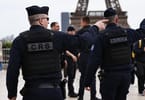China’s government is confronting the limits of its control, as a deadly attack on an American near the capital’s historic center and violence in its restive northwest that killed 11 people tarnished the opening days of the Olympic Games.
China’s ruling Communist Party has tried to ensure the Olympics would proceed without a hitch. Visa approvals for foreigners were scaled back ahead of the Games, and the government enlisted more than 100,000 soldiers, police and volunteers to safeguard the capital.
Officials have required top executives at some Chinese companies and foreign Olympic sponsors to sign documents promising to take personal responsibility for any mishaps that happen within their purview during the Games, according to people familiar with situation.
For China’s government, the Olympics are an occasion to show the world China’s growing economic, technological and athletic strength. The government hopes the Games will be a crowning achievement of Communist Party rule in the eyes of the domestic audience — a demonstration of the party’s success in transforming China into a global power. Perhaps reflecting that agenda, Saturday’s attack on U.S. citizens was given scant attention in China’s state-controlled media.
The attack, in which the father-in-law of a U.S. volleyball coach was stabbed to death and his wife and a guide were seriously injured, came 12 hours after the conclusion of the Opening Ceremonies, viewed by billions around the world.
The stabbings killed Todd Bachman, a businessman from Lakeville, Minn., and the father-in-law of men’s indoor-volleyball head coach Hugh McCutcheon. Mr. Bachman was the chief executive of a family-owned chain of floral and garden centers in the Minneapolis-St. Paul area.
Mr. Bachman’s wife, Barbara, sustained “serious and life-threatening injuries,” the U.S. Olympic Committee said in a statement. The Bachmans were with their daughter, Elisabeth Bachman McCutcheon, when they were attacked, but she wasn’t injured, the USOC said. The injuries to the guide weren’t considered life-threatening, said a Chinese official.
The assailant, an unemployed Chinese man, killed himself after the stabbings, and his motive remains unclear. Authorities described him as angry at society, and former neighbors said in interviews that he had appeared to spiral into despair in the years since he was laid off from a factory job.
Still, the weekend’s events suggest it may be harder than the government anticipated to manage perceptions of the Games. Sunday, 10 alleged terrorists were killed in a battle with Chinese police after a series of blasts from homemade explosives killed one man and injured five others in China’s predominantly Muslim northwest, state media said.
Meanwhile, a military clash between Russia and Georgia, which began shortly before the Opening Ceremonies and escalated throughout the weekend, overshadowed the Olympic themes of peace and internationalism. Russian Prime Minister Vladimir Putin, who attended the Opening Ceremonies Friday in Beijing, left the Games ahead of schedule Saturday to travel to the conflict area.
Chinese media Sunday largely focused on China’s first two gold medals — initial steps in the country’s quest to overtake the U.S. in this year’s medal count — and more broadly on the successes of the Games. The stabbings weren’t mentioned in the 7 p.m. newscast of national broadcaster China Central Television, seen by most of the country’s population.
“Before this, China was subjected to all kinds of unfair comments about its hosting of the Olympics,” said a story on the front page of the Global Times, published by the leading party newspaper, the People’s Daily. “The Opening Ceremonies and the recent behavior by the Chinese people have shown to the world this country’s unprecedented self-confidence and maturity.”
Chinese officials have taken pains to show a hospitable, cosmopolitan Beijing to the world, training thousands of Olympics workers in English and schooling city residents on how to properly line up. Faced with an episode that threatened to taint that positive image, officials said they would step up security at tourist sites around the capital in response to the attack.
“Beijing is safe, though not immune to violent acts,” said Wang Wei, executive vice president of the Beijing Olympics organizing committee. “We are all actually surprised.”
The stabbings occurred at about 12:20 p.m. at the Drum Tower, an ancient landmark in north central Beijing. Chinese authorities identified the assailant as Tang Yongming, a 47-year-old resident of Hangzhou, about three hours southwest of Shanghai. They said that he leapt to his death from a 40-meter-high balcony on the Drum Tower after the attack.
Police on Sunday night said they had made a preliminary conclusion after “careful investigation” that Mr. Tang’s acts resulted from a “loss of confidence in life” that led him to “take out his anger against society.”
Mr. Tang lived until about two years ago in apartment No. 201 in a dingy building that housed workers at a Hangzhou instrument factory. In interviews, several former neighbors described Mr. Tang as a once-friendly man who fell into despair nearly three years ago after he lost his roughly $100-a-month income as a machine operator and split with his wife. They said he was deeply disappointed in his 21-year-old son, who police say has had repeated problems with the law.
“We had a good relationship. When I cooked, he would stand here, smoke and chat,” said Hu Jinmao, a neighbor for several years. Mr. Hu said Mr. Tang was visibly depressed when he bumped into his former neighbor at a local market. “It seems his personality changed 180 degrees,” said Mr. Hu, noting his old friend hardly would say hello and held his head low.
China’s Xinhua, citing police, said Mr. Tang terminated his lease with his current landlord on the afternoon of Aug. 1 and called his son to tell him he was out doing business. He told his son that if it turned out well, he would come home, and if he didn’t come back his son needn’t look for him.
Serious crimes against foreigners remain rare and Beijing and other major cities here are considered safer than big cities in other developing countries.
Chinese President Hu Jintao offered condolences for the attack to President George W. Bush, who is also attending the Games, in a meeting Sunday.
Chinese and U.S. officials stressed that they believe it was an isolated incident. “This was apparently a random act of violence,” said White House spokeswoman Dana Perino. Darryl Seibel, a USOC spokesman, noted that the victims weren’t wearing anything “that would identify them as Americans.” He said he couldn’t recall an incident like this at past Olympics.
Meanwhile, the attack in Xinjiang, which occurred about 2:30 a.m. local time Sunday, killed one man and injured several others before the attackers were shot by police or killed themselves, according to Xinhua. The incident follows an even deadlier attack last Monday, in which authorities said 16 border-patrol police were killed by two assailants.
Chinese security forces have for decades battled at-times violent campaigns by Uighur (pronounced: WEE-ger) groups seeking independence from China. The violence in Xinjiang underscores the limitations of Beijing’s approach to dealing with the country’s ethnic minorities: using economic development in an effort to win hearts and minds while cracking down on political dissent and extremists.
Sunday’s blasts rocked the town of Kuqa, an important staging point for oil-and-gas exploration projects, in an area largely populated by Turkic-speaking Muslim Uighurs. Xinhua reported that attackers used explosives to attack shopping centers, hotels and government offices. Police said two alleged bombers killed themselves when faced with capture, Xinhua said.






















